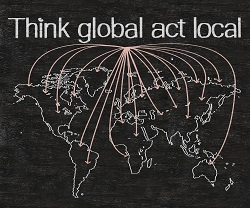
Damianos Soumelidis
 Our world is flat, isn’t it? In a global market that is increasingly dominated by digital processes and where political and historical boundaries are rapidly losing relevance, companies of all sizes and from various industries regard the seemingly equidistant agglomerations as their target markets. There are simply fantastic opportunities offered by digitization that make direct presence in previously almost inaccessible regions seductively simple. Giants of the digital era, such as Microsoft, Google or Apple are not the only ones considered as role models for this “blueprint roll-out concept”. Major brands with rich histories like HP, Nestlé, and Adidas have applied the concept as well. Consequently, local businesses who want to or who have to act globally, have to broaden their presence through the copy-paste approach as well.
Our world is flat, isn’t it? In a global market that is increasingly dominated by digital processes and where political and historical boundaries are rapidly losing relevance, companies of all sizes and from various industries regard the seemingly equidistant agglomerations as their target markets. There are simply fantastic opportunities offered by digitization that make direct presence in previously almost inaccessible regions seductively simple. Giants of the digital era, such as Microsoft, Google or Apple are not the only ones considered as role models for this “blueprint roll-out concept”. Major brands with rich histories like HP, Nestlé, and Adidas have applied the concept as well. Consequently, local businesses who want to or who have to act globally, have to broaden their presence through the copy-paste approach as well.
Let me say this upfront: I do not like this approach. My reason for that does not stem from an effort to sentimentally cling to familiar structures and processes or decrease flexibility, or a distrust of new things (I’m 53 years old, after all). It is, in fact, my deep conviction that the centrally prescribed enforcement of globally applicable rules and concepts blank out and deliberately ignore any kind of individual and locally valid market nuances for the sake of scalability and profitability.
Business is all about business. However, deals are usually made between people (except perhaps in capital markets, which are controlled by algorithms). And people have what defines us all as individuals – individuality. What I mean is that there is no company globally which could claim not to have a corporate culture or claim that people, whether they are customers, employees or partners are not their “most valuable asset”. Cultures, even corporate cultures are not shaped by processes or products, but by people who carry hundreds, sometimes thousands of years of history, tradition and geo-specific embossing. In this increasingly flat world, we cannot ignore individuality and locality in a global corporate culture, let alone consciously inhibit it.
For growth and expansion, we move into markets where people are different and think differently. Humor, risk awareness, innovation, consciousness of tradition, trust, openness, guardedness, communicativeness, environmental awareness, economic thinking, social awareness, profit motives, language, appearance – there are countless factors that differentiate and individualize sales, production, integration, acquisition, marketing, communication and employment compared to well, somewhere else. Therefore, taking individuality and local imprints into account should have a prominent place in a global company’s culture.
On the journey to growth in new markets, new groups of people join an expanding company, either through acquisitions or regular employment. These individuals have to acclimatize to the new structures, and often they reject them because they seem incongruous, foreign or simply “different”. This reflexive rejection of central guidelines and a lack of willingness to integrate into global structures is nothing but ignorance and robs a global company of its biggest asset: a healthy mix of perspectives, opinions and peculiarities in combination with efficient scalable structures and processes and the optimal use of specific advantages from each region or business unit.
Nagarro is growing rapidly and it is confidently establishing itself and its services in various geographical locations all over this flat world. It is understandable that it bears the risk of losing sight of quiet sounds and nuances. This is necessary for building trust and an understanding of local human needs when traveling at high speed and with constant success. However, it is incomprehensible on second glance because sustainable success can only be achieved by taking account of local individual needs and worldviews. Upon closer examination, in addition to quality and expertise, free thinking and free actions are the pillars of success which are in alignment with our sales and delivery structure in local markets and customer environment. Free thinking and free actions are what define Nagarro.
It is the responsibility of the management to take the diversity of people from various regions into account when constructing our global corporate structure. However, it is our joint responsibility to understand that distinct local thinking, and a simultaneous neglect or even ignorance or deliberate denial of global perspectives, structures, processes and policies cannot prevail in this world.
Political boundaries are truly irrelevant. The way people treat each other individually and interact with each other will and should shape and influence our corporate culture in the years to come.




